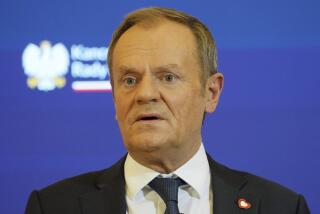Poland’s Economy Shows Few Signs of Progress : Nation Fails to Reach Modest Targets in Most Sectors During 1st Half of Year
- Share via
WARSAW — Poland’s debt-burdened economy, which suffered yet another blow this spring in the aftermath of the Chernobyl nuclear accident, has continued to perform poorly through the first six months of the year and shows little sign of reviving in the near future, according to Western economic analysts.
Official figures released this week show Poland’s trade surplus with the West, with which it services its $31-billion debt, running behind last year’s, which in turn registered a 28% decline from 1984. The economy failed to perform up to modest plan targets in most sectors, from transportation to agriculture.
Industrial output showed an encouraging 5.4% growth over the first six months of 1985, nearly twice the target, but this surge failed to reflect itself in exports. “Industrial growth seems to be the single bright spot in the economy,” one diplomatic analyst observed. “Now they have room to collapse in the second half.”
Despite stringent efforts to control the growth of imports, the value of imported goods grew 7.6% over the first six months of 1985, measured in constant prices, while exports grew by only 2.7%, according to the government’s Main Office of Statistics.
Sharp Decline from 1984
Poland’s all-important trade surplus with the West amounted to what one analyst called an “abysmal” $430 million, a figure that suggests the country will have difficulty equaling the 1985 surplus of $1.08 billion. This, in turn, marked a sharp decline from the $1.5 billion earned in 1984. The government’s original target for this year was $2 billion.
At the same time, during the first half of 1986, Poland’s debt to the West rose $2 billion to $31.3 billion. The debt is roughly equally divided between dollars and West German marks, and much of the increase, analysts said, was due to shifting exchange rates.
The government estimates that it lost $40 million to $50 million in food exports to Western Europe when the European Communities banned potentially contaminated Polish products in May, after the radioactive cloud from the Chernobyl nuclear plant accident blew across Poland. But food sales to Western Europe continued to run about 10% below last year in June, even after the ban was lifted, reflecting lingering damage to Poland’s Western markets.
West Blamed for Losses
Premier Zbigniew Messner said recently that, if sustained, these market losses could cost Poland as much as $200 million by the end of the year. In keeping with an ideological taboo on criticism of the Soviet Union, official Polish commentators blame these losses on West European governments, which are said to have acted on groundless fears of radioactivity.
Both Polish and Western analysts attribute Poland’s economic stagnation to a variety of convergent factors. One is sheer inefficiency in the use of labor and materials by state-owned industry, which remains shielded from bankruptcy by huge government subsidies. Shortages of imported parts and materials add to the problem, and much of Poland’s heavy industry plant--despite the billions borrowed in the 1970s--is woefully obsolete.
Political instability no longer is a cause of Poland’s economic troubles. The Solidarity trade union is alive as an idea, but the work force is quiescent. Neither workers nor managers are offered meaningful incentives, such as higher pay or loss of employment, to produce quality goods that could be marketed in the West.
Inflation Still a Problem
At the same time, the government has had little success in stemming wage inflation (wages rose 19.5% compared to the first half of 1985) while retail prices were up by 18%. Previously, the government had insisted that wages should rise no faster than labor productivity, which climbed by 5% from the same period last year.
Moreover, the government has slipped still further behind in alleviating what is arguably Poland’s most severe social problem and a major contributor to worker discontent--the shortage of housing. Millions of families must now wait 10 to 15 years for a state-built apartment. Relatively few can afford the high costs of privately built apartments or houses.
Nevertheless, the number of new state-constructed apartments fell by 6.2% compared to the first half of 1985. Last year, the state managed to complete nearly 4% fewer apartments than in 1984, and Polish newspaper reports have indicated that even this figure may have been inflated.
Hopes for New Credits
Poland has recently joined the International Monetary Fund and the World Bank, and the government hopes this may open the way to as much as $1.5 billion in fresh credits, a figure diplomatic analysts say is unrealistically high.
In the meantime, some Western European countries have resumed guaranteeing relatively small, short-term credits for the first time since 1981, when the United States and its North Atlantic Treaty Organization allies imposed sanctions in retaliation for the imposition of martial law and the suppression of Solidarity. West Germany granted a 100-million-mark ($44-million) export loan guarantee in March and Britain followed suit last month with a $30-million loan. A U.S. ban on government-backed credits remains in force.
Polish strategy is to assign new credits selectively to industrial projects with the highest promise of export payoff. But analysts note that even with fresh credits, these efforts can do little in the short term to stimulate the economy.
More to Read
Sign up for Essential California
The most important California stories and recommendations in your inbox every morning.
You may occasionally receive promotional content from the Los Angeles Times.













